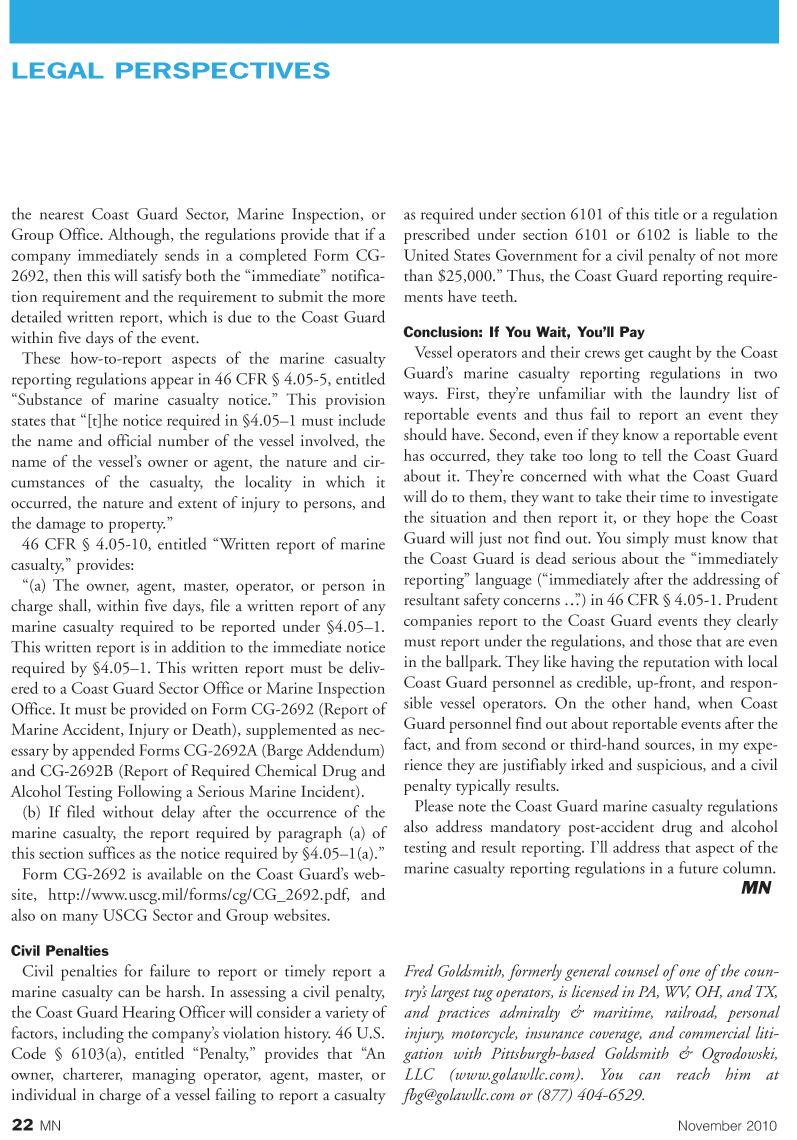
Page 22: of Marine News Magazine (November 2010)
Workboat Annual
Read this page in Pdf, Flash or Html5 edition of November 2010 Marine News Magazine
22 MN November 2010
LEGAL PERSPECTIVES the nearest Coast Guard Sector, Marine Inspection, or
Group Office. Although, the regulations provide that if a company immediately sends in a completed Form CG- 2692, then this will satisfy both the “immediate” notifica- tion requirement and the requirement to submit the more detailed written report, which is due to the Coast Guard within five days of the event.
These how-to-report aspects of the marine casualty reporting regulations appear in 46 CFR § 4.05-5, entitled “Substance of marine casualty notice.” This provision states that “[t]he notice required in §4.05–1 must include the name and official number of the vessel involved, the name of the vessel’s owner or agent, the nature and cir- cumstances of the casualty, the locality in which it occurred, the nature and extent of injury to persons, and the damage to property.” 46 CFR § 4.05-10, entitled “Written report of marine casualty,” provides: “(a) The owner, agent, master, operator, or person in charge shall, within five days, file a written report of any marine casualty required to be reported under §4.05–1.
This written report is in addition to the immediate notice required by §4.05–1. This written report must be deliv- ered to a Coast Guard Sector Office or Marine Inspection
Office. It must be provided on Form CG-2692 (Report of
Marine Accident, Injury or Death), supplemented as nec- essary by appended Forms CG-2692A (Barge Addendum) and CG-2692B (Report of Required Chemical Drug and
Alcohol Testing Following a Serious Marine Incident). (b) If filed without delay after the occurrence of the marine casualty, the report required by paragraph (a) of this section suffices as the notice required by §4.05–1(a).”
Form CG-2692 is available on the Coast Guard’s web- site, http://www.uscg.mil/forms/cg/CG_2692.pdf, and also on many USCG Sector and Group websites.
Civil Penalties
Civil penalties for failure to report or timely report a marine casualty can be harsh. In assessing a civil penalty, the Coast Guard Hearing Officer will consider a variety of factors, including the company’s violation history. 46 U.S.
Code § 6103(a), entitled “Penalty,” provides that “An owner, charterer, managing operator, agent, master, or individual in charge of a vessel failing to report a casualty as required under section 6101 of this title or a regulation prescribed under section 6101 or 6102 is liable to the
United States Government for a civil penalty of not more than $25,000.” Thus, the Coast Guard reporting require- ments have teeth.
Conclusion: If You Wait, You’ll Pay
Vessel operators and their crews get caught by the Coast
Guard’s marine casualty reporting regulations in two ways. First, they’re unfamiliar with the laundry list of reportable events and thus fail to report an event they should have. Second, even if they know a reportable event has occurred, they take too long to tell the Coast Guard about it. They’re concerned with what the Coast Guard will do to them, they want to take their time to investigate the situation and then report it, or they hope the Coast
Guard will just not find out. You simply must know that the Coast Guard is dead serious about the “immediately reporting” language (“immediately after the addressing of resultant safety concerns ….”) in 46 CFR § 4.05-1. Prudent companies report to the Coast Guard events they clearly must report under the regulations, and those that are even in the ballpark. They like having the reputation with local
Coast Guard personnel as credible, up-front, and respon- sible vessel operators. On the other hand, when Coast
Guard personnel find out about reportable events after the fact, and from second or third-hand sources, in my expe- rience they are justifiably irked and suspicious, and a civil penalty typically results.
Please note the Coast Guard marine casualty regulations also address mandatory post-accident drug and alcohol testing and result reporting. I’ll address that aspect of the marine casualty reporting regulations in a future column.
MN
Fred Goldsmith, formerly general counsel of one of the coun- try’s largest tug operators, is licensed in PA, WV, OH, and TX, and practices admiralty & maritime, railroad, personal injury, motorcycle, insurance coverage, and commercial liti- gation with Pittsburgh-based Goldsmith & Ogrodowski,
LLC (www.golawllc.com). You can reach him at [email protected] or (877) 404-6529.

 21
21

 23
23
